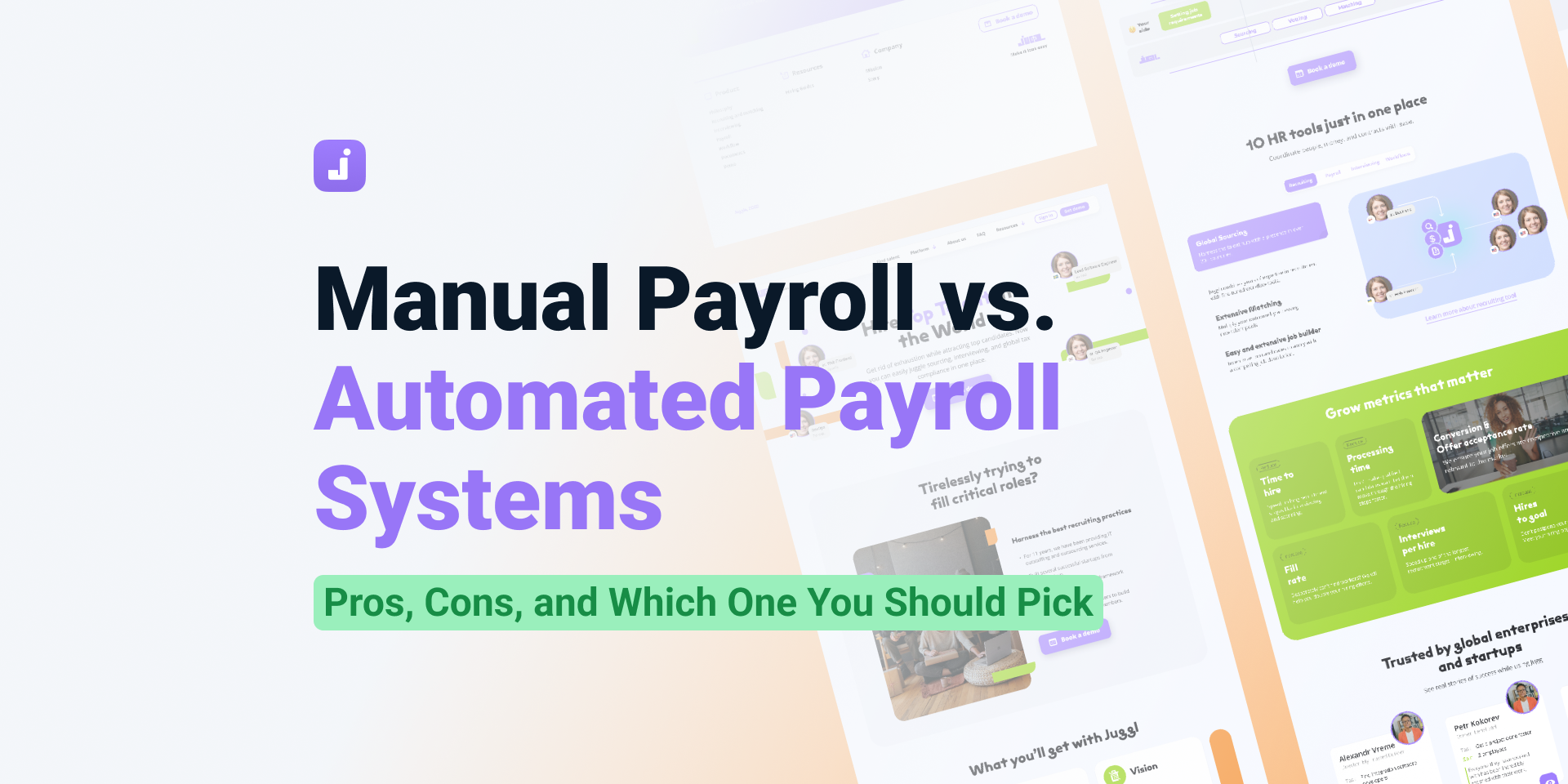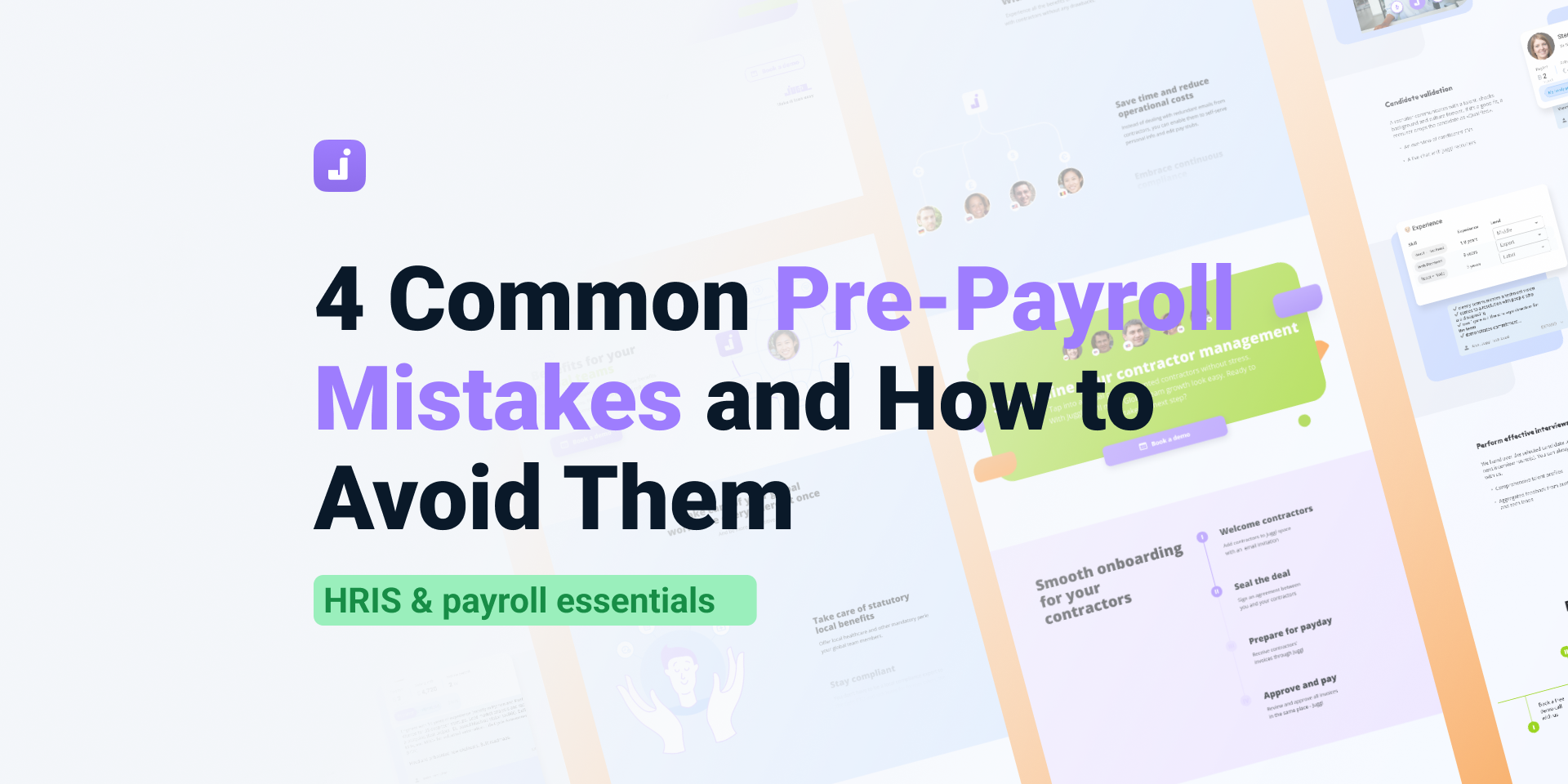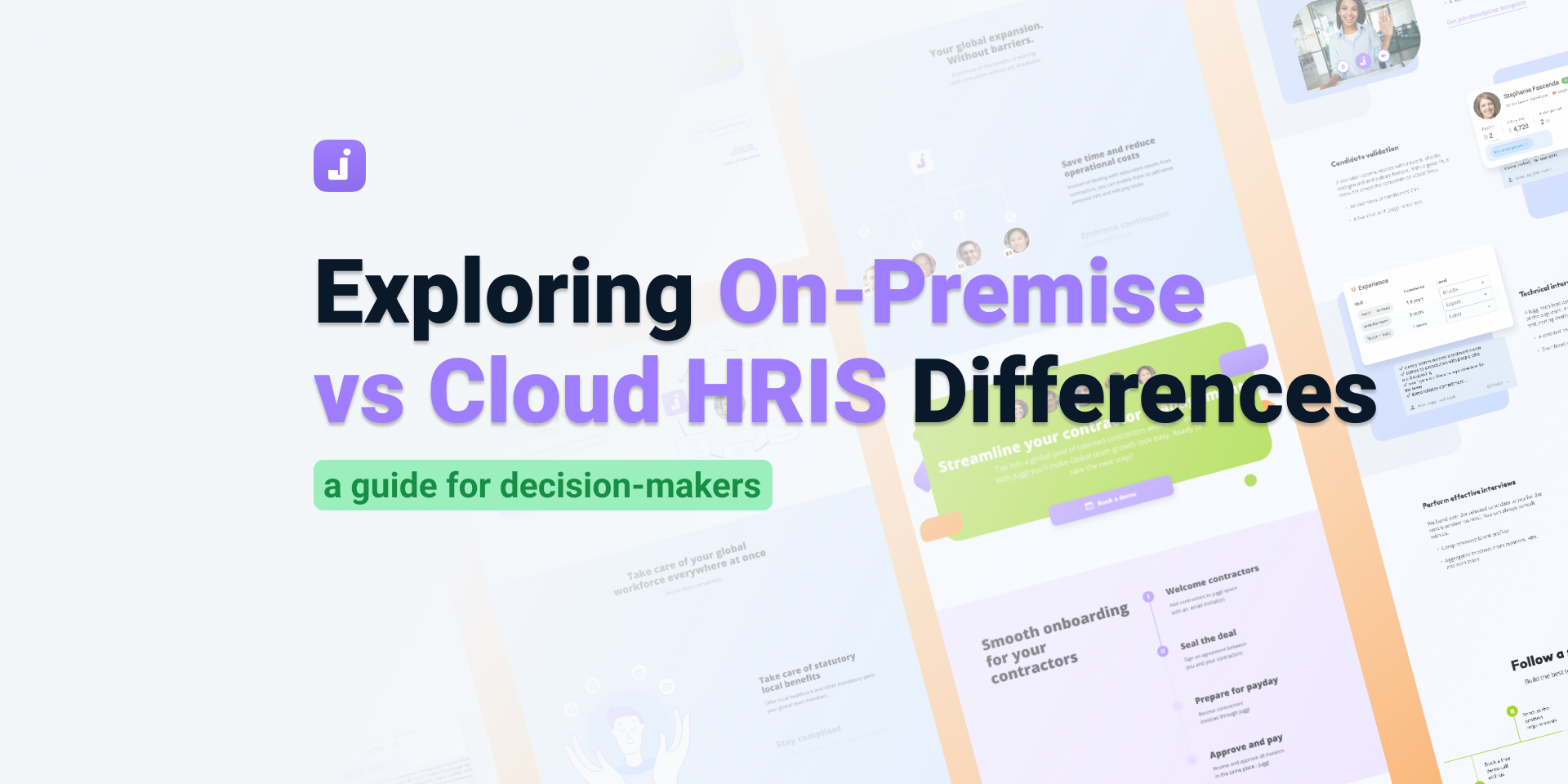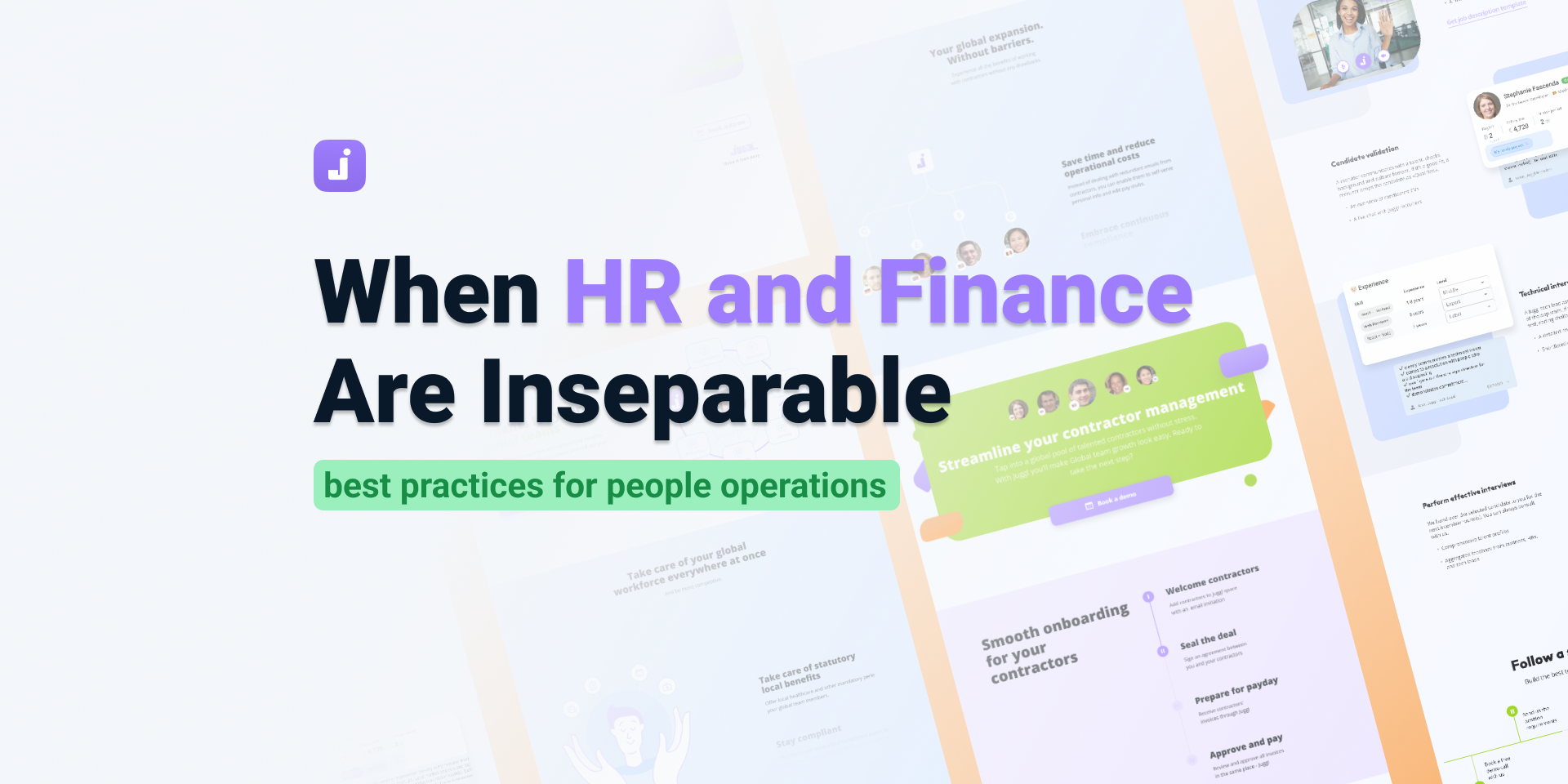Top 10 Tipalti Alternatives in 2025: The Strategic CFO’s Guide to Global Payroll
Streamlining global payouts has always meant choosing between complexity and compliance. Tipalti stepped in and built a name solving that very equation — automating mass payments and helping finance teams sleep better at night.
But fast-forward to 2025, and the field has expanded. Massively. If Tipalti was version 1.0 of the global finance operating system, we’re now staring down version 4.5, with smarter APIs, sharper compliance controls, and platforms that understand your business structure isn’t one-size-fits-all.
Today’s CFOs, HR leads, and global operations execs are asking deeper questions:
- Should our invoicing stack integrate with spend cards or stay modular?
- Do we need a global EOR, or are we overpaying for compliance we don’t use?
- What happens if our contractor is misclassified in Brazil — and who’s on the hook?
That’s where this guide comes in.
We went deep into the top alternatives to Tipalti in 2025. From full-stack workforce infrastructure players like Deel and Remote to finance-first disruptors like Ramp and Airbase, each of these solutions solves a different kind of operational headache.
This isn’t just a feature matrix. It’s a decision guide for leaders who want to reduce vendor sprawl without compromising on control, compliance, or clarity. Whether you’re managing payroll across six continents or just trying to stop bleeding money through legacy AP workflows, this is the strategic lay of the land.
Let’s get into it.
Comparison: The table below summarizes how each alternative handles core functionalities (✔️= robust support, ⚠️= partial/limited, ❌= not a focus).


TL;DR: Who's winning where?
- Juggl innovates with transparent pricing and full-scope contractor payroll.
- Deel and Remote dominate global workforce compliance and EOR services.
- Ramp is the cost-efficiency disruptor with a finance OS built on interchange.
- Yooz delivers high automation ROI for mid-sized AP teams.
- Coupa remains the gold standard for enterprise procurement suites.
Let’s unpack the nuance behind each, beyond the pricing grids.
1. Juggl: Modular Contractor Payments with Real HR Intelligence
Operating at the intersection of payroll, compliance, and workforce strategy, Juggl is not a straightforward alternative to Tipalti, yet it offers robust possibilities for invoice automation. With transparent per-user pricing (starting from ~$8/user/month) and localized payroll logic, it offers a compelling solution for global contractor management at scale.
Juggl embeds intelligence into the payroll layer, mapping compliance nuances across geographies and enabling strategic workforce decisions (e.g., contractor-to-full-time employee transitions). Unlike others, Juggl integrates hiring workflows, payroll, and workforce analytics in one interface – ideal for CFO-HR collaboration.
Why it matters:
- Juggl offers flat per-user pricing, which scales gracefully without hidden costs. No bloated seat licenses. No disproportionate extra charges for growth.
- With contractor management as a core feature and integrated EOR support upon request, you can shift engagement models without switching platforms.
- Smooth onboarding and easy handling of contractors alongside permanent employees allows for easy contractor-to-FTE transitions.
- Modular approach to compliance: You can bring your own legal entity and still use Juggl's tech stack for payroll and onboarding.
- Rule-based invoice generation for contractors
- Built-in workforce analytics (retention, pay equity, performance, and productivity) that don’t feel like an afterthought.
Use case fit: Agencies, consultancies, and growth-stage firms with contractor-heavy models seeking scalable HR infrastructure.
For global-first companies tired of managing spreadsheets, shadow vendors, and costly misclassification risks, Juggl doesn’t just replace Tipalti. It rewrites the category.
2. Remote: Compliance-First Global Payroll, with No Middlemen
Unlike Tipalti with its strong focus on automating global payments and supplier management, Remote's strength lies in its decision to go fully in-house: 100+ owned legal entities allow them to guarantee consistent employment compliance without relying on third-party partners.
For companies under regulatory scrutiny or those who simply want peace of mind, Remote's unlimited EOR indemnification and transparent pricing (e.g. $599/per employee/month for EOR services) provide rare clarity and risk protection.
Remote is becoming the go-to for enterprise legal teams advising conservative hiring strategies abroad. Its $99/month contractor misclassification warranty and tiered service levels let clients align spend with risk. It is the platform you choose when your board's legal counsel is in the room. It’s not the flashiest, but it might be the safest – and that’s not a knock.
Where Remote stands out:
- 100% owned entities (not partner-based)
- Unlimited indemnity baked into contracts – not a $99/month add-on
- Clear flat-rate pricing for both EOR and contractors
- Tiered contractor support: from basic to "Contractor of Record"
Remote makes a sharp argument for CFOs who want predictability and compliance without a maze of hidden fees. You may sacrifice some UX polish, but what you gain in risk mitigation is tangible.
Use case fit: Conservative multinationals, regulated sectors, companies scaling in LATAM, APAC, or MENA where legal nuance can derail HR ops.
3. Deel: Velocity, UX, and the Broadest HR Scope
Overlapping with Tipalti in core functionalities for global payments, Deel still sets the pace on feature breadth. With built-in Slack workflows, advanced HRIS modules, equity tooling, and regional tax handling, Deel appeals to startups and fast-scalers who want a single pane of glass. It also covers 150+ countries with both owned and partnered entities.
Deel wins on execution speed. They roll out features faster than competitors, often responding to edge-case user requests before others notice. But Deel sometimes relies on third-party EOR partners, which may limit control in fringe markets. Also, their security deposit model (recently relaxed) raised eyebrows for capital-conscious CFOs.
Deel built its empire on speed: speed to hire, speed to pay, speed to enter new markets. It’s the go-to platform for startups that want global talent yesterday. With a broad EOR footprint and constant product releases, Deel stays ahead of the game.
But here’s the real advantage: Deel isn’t just an HR/payroll tool anymore – it’s becoming a full-stack global workforce platform.
What makes Deel powerful:
- Over 150+ countries with local legal entities
- A deep set of HRIS features (org charts, reviews, PTO, document vaults)
- Equity compliance support for international stock options
- A new suite of payroll tools (Deel HR, Deel Engage)
The caveat? Pricing can creep. Every new feature comes with an add-on, and their flat-rate simplicity of early years is gone. But if you need speed and coverage above all else, Deel delivers.
Use case fit: Venture-backed scale-ups, tech unicorns, or companies needing a consumer-grade HR UX and rapid country activation.
4. Yooz: The Quiet Powerhouse in AP Automation
The next on the list of Tipalti’s closest alternatives is Yooz. It doesn’t do workforce but rather automates accounts payable with the help of AI. For mid-market companies still pushing PDFs around, Yooz turns invoice chaos into clean, auditable workflows. Its OCR engine is tuned with years of vendor data, and integrations with over 200 ERPs make adoption frictionless.
Yooz beats legacy AP tools (and even Bill.com) by combining enterprise-grade AI with sub-$200/month pricing. Unlimited users make it a CFO’s dream for distributed approval chains.
Yooz’s AI extracts full line-item data with impressive accuracy, and its invoice approval workflows are simple to set up and quick to adopt. Unlike more bloated tools, Yooz is cloud-first, fast to deploy, and intuitive for approvers.
Limitation: Yooz won't pay your vendors. It facilitates, it does not transact. But as AP workflow middleware, it's unmatched for its price point.
What sets Yooz apart:
- A plug-and-play cloud-based automation solution for E-invoicing and Purchase-to-Pay (P2P).
- 15 days free trial available.
- Pay-as-you-go subscription model, with the price depending on the number of invoices processes.
- Integration with over 200 ERPs (including QuickBooks, Xero, and Dynamics).
Why it matters for CFOs:
For finance leaders looking to retire manual invoice entry, Yooz is a no-brainer. Starting at ~$199/month with unlimited users, it’s an easy way to cut AP time, reduce errors, and unlock early payment discounts – without waiting six months for implementation. It is built for invoice precision, not borderless payouts.
Use case fit: Finance teams in education, hospitality, nonprofits, and SMBs tired of manually keying invoice lines.
5. Bill: Reliable AP Automation for Mid-Market Finance Teams
The nearest competitor to Tipalti, Bill (formerly Bill.com) is a well-established accounts payable platform serving mid-sized businesses across industries. It offers a straightforward path to automating invoice approvals, payments, and reconciliation, with deep integrations into accounting systems like QuickBooks, NetSuite, and Sage. Its strength lies in reliability, simplicity, and vendor adoption at scale.
Where Bill stands out:
- End-to-end AP coverage: From digital invoice capture to approval routing and integrated payment execution (ACH, check, virtual card), Bill covers the full invoice-to-pay lifecycle.
- ERP-native sync: Bill is tightly integrated with major accounting systems, ensuring accurate data flow and minimizing reconciliation errors – a key advantage over generic workflow tools.
- Scalable pricing model: Plans start at ~$45/user/month with additional per-payment fees. While costs can add up with high transaction volumes, the modular structure allows phased adoption.
Limitations:
- Limited global capabilities compared to platforms like Tipalti or Airbase: Initially, Bill was best suited for US-centric businesses. Currently Bill supports international payments to over 130 countries all over the world, with a possibility to make transactions in local currencies without intermediary transfer commissions.
- Per-user pricing: For finance teams with many approvers or departments, costs can escalate unless carefully managed.
Bill is a mature and dependable option for automating payables in the mid-market. It won’t solve global finance complexity, but it delivers strong ROI in core AP workflows – especially for companies ready to move beyond manual invoice handling without jumping to enterprise-level systems.
Use case fit:
Finance teams at growing mid-market firms managing high volumes of recurring vendor payments who prioritize visibility, audit-readiness, and system interoperability.
6. Stampli: AP Automation with a Collaboration-First UX
Stampli takes a different angle on AP by focusing heavily on collaboration and visibility. Rather than just streamlining invoice processing, it centralizes conversations, comments, and approvals around each invoice, reducing miscommunication and increasing accountability. With built-in AI (Billy the Bot) that learns coding and routing behavior, Stampli minimizes manual work and approval delays.
Why it matters:
- Collaboration-first interface: Each invoice becomes a shared workspace – stakeholders can ask, respond, and clarify directly inside the platform.
- AI-driven automation: Stampli learns GL coding patterns, auto-suggests approvers, and handles repetitive logic over time.
- ERP-agnostic: Works with over 70 ERPs and custom systems, which is ideal for companies mid-way through digital transformation.
Tradeoffs to consider:
- Payments are integrated: Primarily focused on approvals, not execution, Stampli currently offers the Stampli Direct Pay module. You’ll still need a partner or bank integration for disbursements.
- Pricing transparency: Costs are volume-based and depend on the size of the implementation. While affordable for most mid-market firms, large teams should model total cost with integrations.
Stampli isn’t trying to reinvent the finance suite – which business leaders like Tipalti or Bill do well. It’s here to fix what’s broken in AP: conversations, clarity, and coding delays. If invoice backlogs are your bottleneck, it may be your most pragmatic fix.
Use case fit:
Finance teams frustrated by endless email chains and status checks. Especially relevant for companies with high volumes of vendor queries or distributed approval chains.
7. Airbase: Spend Management with Built-In Control
Airbase is positioned more broadly than pure AP automation – it’s a unified spend management platform that wraps corporate cards, bill pay, reimbursements, and approvals into a single interface. This full-stack approach is ideal for CFOs who want real-time spend visibility and policy enforcement without stitching together multiple tools.
Airbase provides comprehensive global payment support, with the possibility to make payments in over 145 different currencies to over 200 countries. However, the platform does not support complex compliance requirements for EOR or complex global tax handling.
Key insights from the field:
- Airbase doesn’t charge per transaction or per module – it's subscription-based
- Strong audit trail and role-based permissions
- It’s not into payroll calculations but rather spend management analytics
- Deep policy automation: who can spend what, when, and how
- Direct sync with ERPs like NetSuite, Sage Intacct, QuickBooks
Airbase centralized disbursements and kept finance in control, making it a smart choice for modern finance teams aiming for agility without chaos. Plans vary based on usage and size. While it can replace several tools, it’s not always the cheapest option.
Use case fit:
High-growth companies with fragmented spend processes across cards, invoices, and expense reports – especially those scaling quickly or tightening controls post-funding.
8. Coupa: Enterprise Procurement Powerhouse
Coupa is the heavyweight in the enterprise procurement space — a full Business Spend Management (BSM) suite designed for Fortune 500-level complexity. It offers end-to-end functionality across procurement, AP, T&E, and supplier management with robust controls, auditability, and forecasting tools.
Why it matters:
- Full-suite power: From RFPs and contract lifecycle management to AP and spend analytics, Coupa centralizes everything.
- Powered with AI/ML, the platform does well in analysis, automation, fraud detection, and optimizing supply chains.
- Enterprise-grade controls: Fine-grained permissions, automated risk scoring, and multi-tier approval trees make it ideal for governance-heavy environments.
- Ecosystem integrations: Coupa connects with Oracle, SAP, Workday, and more, ensuring it's not a bolt-on but part of your ERP fabric.
Tradeoffs to consider:
- Cost and complexity: Median deal size is ~$90k/year; implementation can take months and require dedicated internal resources.
- Overkill for mid-market: If your company doesn’t have a procurement team or global compliance risk, Coupa might be more than you need.
Coupa is not for the faint of heart – but if you’re navigating procurement across 20+ countries and thousands of vendors, it’s a proven and powerful backbone for enterprise finance operations.
Use case fit:
Large enterprises or complex global organizations with formal procurement teams, rigorous compliance mandates, and multimillion-dollar vendor ecosystems.
9. AvidXchange: Enterprise-Grade AP for Invoice-Heavy Sectors
AvidXchange is probably the closest alternative to Tipalti, representing a mature accounts payable automation platform built specifically for mid-sized to enterprise companies that manage high volumes of recurring vendor payments. Its roots run deep in industries like real estate, construction, nonprofit, and utilities, where approval hierarchies are long and invoice formats vary widely.
What makes it special:
- AvidXchange wins in operational scale and control, supporting end-to-end invoice management
- Integrates deeply with industry-specific ERPs
- Handles multi-modal payments (ACH, check, virtual card) from within one system.
- The compliance depth, ERP fit, and scale readiness make it a defensible choice when the AP function is mission-critical.
- The minimal price starts at around $440/month, and the final cost depends on your choice of modules.
For finance leaders, AvidXchange offers workflow assurance and reduced processing risk – especially important in sectors with strict audit requirements or limited tolerance for missed vendor SLAs.
Tradeoffs to consider:
- Pricing model includes both SaaS subscription and per-transaction fees, which means TCO scales with volume. It’s essential to model your invoice throughput carefully.
- Interface and configurability lag behind newer AP-first startups, so teams seeking lightweight tools or self-service setups may find it less intuitive.
- Implementation timeline can run longer, especially with complex ERP landscapes.
Use case fit:
Real estate operators, property managers, HOAs, nonprofits, and enterprise finance teams with dedicated AP staff. Especially well-suited if you already run MRI, Yardi, or another vertical-specific system and need predictable, high-reliability invoice-to-pay automation.
Being a high-end Tipalti alternative, AvidXchange is especially valuable for AP departments dealing with thousands of monthly invoices and recurring payment workflows.
10. Ramp: Zero-Fee Finance Stack That Pays for Itself
Ramp doesn’t look like a direct Tipalti competitor – until you realize it completely rethought how finance teams manage spend. Ramp isn’t AP automation in the traditional sense. It’s a modern finance OS with spend controls, cards, bill pay, and expense management, all monetized through interchange. The result? A zero-subscription platform that rewards use, not volume.
Its core insight is simple: control card-based and bill-based spend in one workflow, and do it without charging software fees.
Ramp is emerging as the default spend management tool for lean finance teams. AP, T&E, card programs, and accounting sync – in one free SaaS product.
Why finance leaders pay attention:
- 2.5% cash back on corporate card spend
- Free bill pay, unlimited users, no markup
- Native Slack workflows and real-time visibility
- Vendor management that actually works for fast-scaling orgs
It’s not a global payroll. It’s not contractor compliance. But for US-centric finance teams looking to modernize AP and eliminate software bloat, Ramp delivers a radically elegant solution.
Caveat:
- Ramp is US-centric. It’s a domestic powerhouse, but global finance remains off the map.
- USD currency only, multi-currency possibilities are limited.
Use case fit: US-based startups, cost-cutting CFOs, or finance teams trying to consolidate financial tooling.
Key takeaway
The modern finance stack isn’t about buying more tools. It’s about orchestrating the right ones – in sync with your compliance risk, workforce model, and growth trajectory.
Tipalti carved out the category, but the landscape in 2025 is no longer one-size-fits-all. Whether you're streamlining contractor onboarding across 20 countries, untangling invoice chaos with AI, or building a future-proof global payroll foundation, the right alternative depends on your organization.
The bottom line? Strategic finance today is less about software selection and more about operational architecture. And these 10 platforms don’t just compete with Tipalti. They reflect what the next generation of finance ops is already building.
Choose what builds leverage — not just what checks boxes.
Juggl leads if you're scaling remote teams and want HR+payroll intelligence baked in. Invoice automation, sleek UI, and simplicity can make a good alternative to Tipalti for growing startups and mids-sized scaling businesses. Schedule a personalized free demo to learn more!
Research conducted via platform demos, pricing analysis, public docs, and verified user reviews as of Q2 2025. Pricing may vary by volume and geography.












